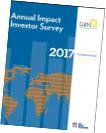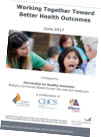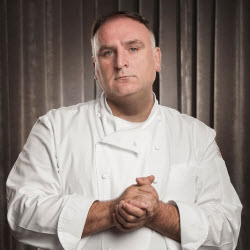
From the rapid growth of social impact investing to the emergence of artificial intelligence apps created by tech-oriented nonprofits, we're seeing some fascinating developments in the human services sector. Scroll down for a look at five that caught our eye, including a piece on celebrity chefs promoting smart solutions to hunger and poverty. – Liz Enbysk
Making money and doing good: Impact investing is catching on
The social impact investing sector has grown rapidly, with some $114 billion impact investments under management, according to a survey by the nonprofit Global Impact Investing Network (GIIN). And experts anticipate that trend will continue as millennials age. GIIN CEO Amit Bouri told CNN Money that socially and environmentally oriented investments will become mainstream "as millennial incomes continue to rise and the generation inherits a massive transfer of wealth from the baby boomers over the next few decades."
Though housing programs appear to be the most popular category of purpose-driven investing, followed by energy, the GIIN report notes the breadth of financing options has exploded in recent years – with millions pouring into mobile health projects in Asia to huge solar projects in Europe.
Nonprofits are leading the charge in creating AI apps for social good
Writing in Recode, Shannon Farley says "miraculous feats" involving artificial intelligence are happening, and she suggests nonprofits are leading the charge in creating human-centered applications of the hottest AI technologies.
Farley is the co-founder and executive director of Fast Forward, an accelerator for tech nonprofits. She believes the technologies emerging from tech-oriented nonprofits – from chatbots to machine learning apps -- "have the potential to rapidly scale and improve the lives of our most underserved communities."
As tech nonprofits deploy these technologies and open source their findings, Farley adds, they can deepen the capacity of all AI applications. But she does believe corporations have a role to play as well in building tools for positive impact.
Also worth a read: IBM’s Open Letter to Congress on Artificial Intelligence
Working together toward better health outcomes
Healthcare organizations and community-based organizations that provide human services are partnering in shared pursuit of better health outcomes. The Partnership for Healthy Outcomes – Nonprofit Finance Fund, the Center for Health Care 
Information from more than 200 partnerships serving all 50 U.S. states provide important lessons from, and for, partnerships that hope to improve access to care, address health inequities and make progress on social issues like food, education and housing.
Social entrepreneurs helping build a better tomorrow
A piece on the Mashable site suggests as the trend toward social entrepreneurship takes hold in economies around the globe, the UN Sustainable Development Goals are coming closer to reality.
The article from UBS – the global financial services firm – highlights young social entrepreneurs dedicated to making a difference. Among them:
- Brendan Carroll, founder of Skycision, which helps farmers collect and analyze aerial imagery -- taken via drone and satellite -- to detect potential crop issues faster and more efficiently.
- Analisa Balares, founder of Womensphere, which empowers women and girls around the globe through education, mentorships and promoting leadership and entrepreneurialism.
- Atif Javed, founder of Tarjimly, which instantly connects refugees, non-profits and immigrants in need of translation services (such as medical or legal aid) to translators around the world.
Also worth a read: Mark Zuckerberg: Government social services should 'give people the dignity and confidence to be entrepreneurial'
How celebrity chefs are going beyond soup kitchens to fight hunger
"It’s a very simple reality that we feed the few, but we have the opportunity to feed the many," Josè Andrès, the Spanish-born, D.C.-based chef who owns 27 restaurants globally, told PEOPLE. "But the two are not at odds with each other. It would  be hard for me to say, when I’m 80 or 90 years old, that I didn’t use my knowledge of feeding others to help the many."
be hard for me to say, when I’m 80 or 90 years old, that I didn’t use my knowledge of feeding others to help the many."
Several years ago, Andrès formed World Central Kitchen, an international organization that promotes smart solutions to hunger and poverty. His organization has helped vulnerable people from Brazil to Zambia by focusing on health, education and jobs.
And he's not alone. The PEOPLE report talks about celebrity chefs – from TV chef Rachel Ray to Food Network star Alex Guarnaschelli – who are actively involved in efforts to reduce hunger and promote nutritious eating.
#CCEOST#



